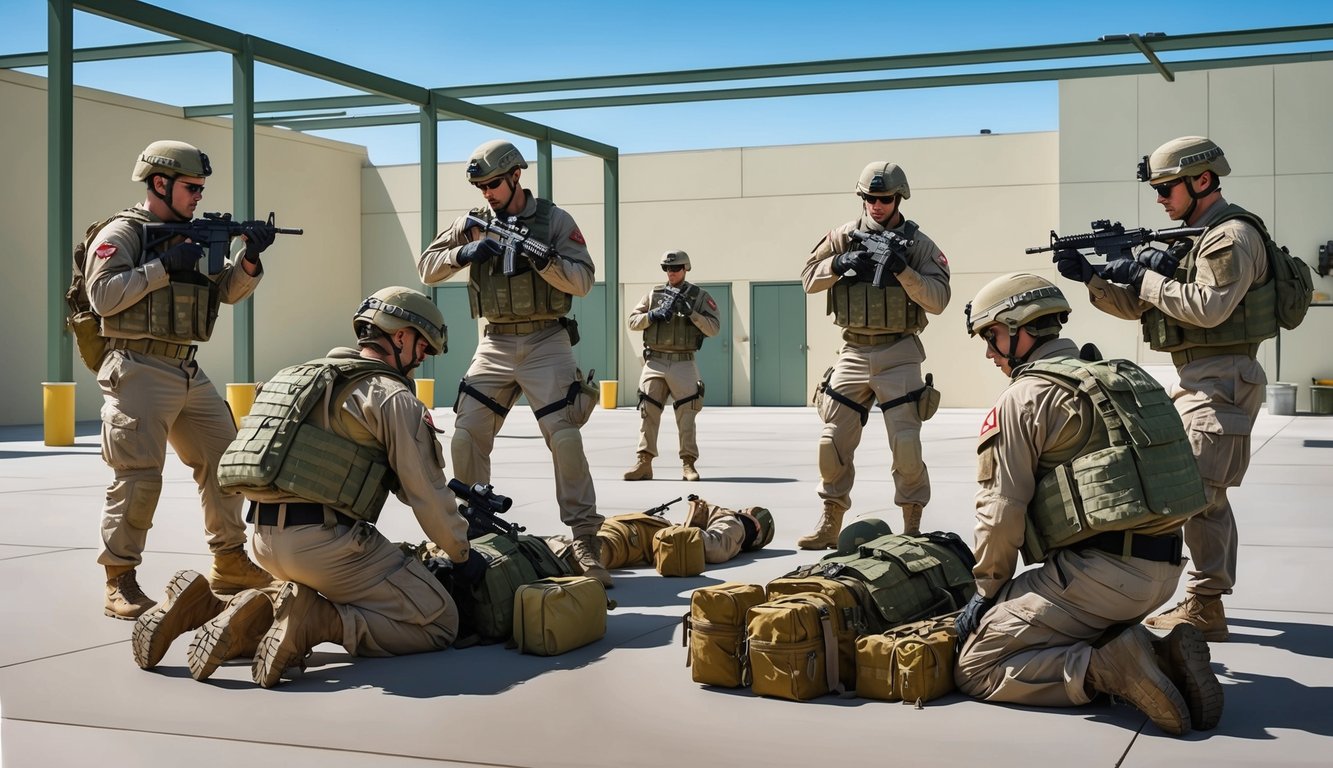“`xml
Starting the journey to become a 68W Combat Medic Specialist is both thrilling and demanding.
As you gear up for this essential position in the U.S. Army, it’s important to be aware of what to expect. The 68W training program merges comprehensive medical education with rigorous physical and mental training to equip you for the challenges of battlefield medicine.
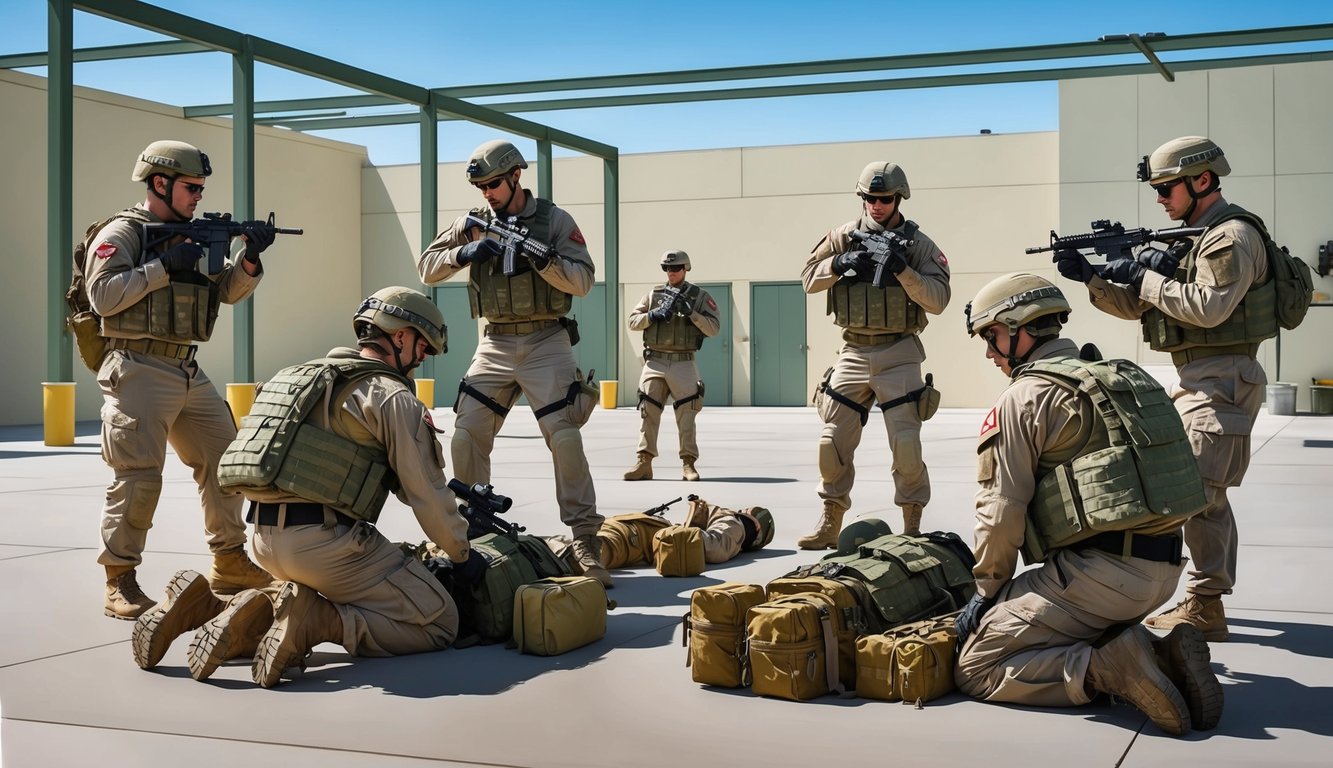
Your training commences with Basic Combat Training (BCT), a transformative 10-week program designed to turn civilians into soldiers.
After completing BCT, you’ll proceed to Advanced Individual Training (AIT) at Fort Sam Houston, Texas, where a 16-week intensive course will teach you specialized skills necessary for saving lives in urgent circumstances.
In this phase, you’ll study anatomy, physiology, and emergency medical protocols, while also refining your tactical abilities.
Your training will challenge you both physically and mentally, featuring long days filled with classroom learning, practical exercises, and physical training.
You’ll develop into a cohesive team member, capable of making critical choices under pressure.
Though the path is difficult, the accomplishment of becoming a proficient combat medic is invaluable.
Key Takeaways
- 68W training integrates medical training with military skills over a duration of 26 weeks
- You will master life-saving procedures and decision-making in high-stress conditions
- This program prepares you for a fulfilling career as a Combat Medic Specialist
Understanding the 68W MOS
As a 68W, you’ll assume the role of a Combat Medic Specialist within the U.S. Army.
This Military Occupational Specialty (MOS) plays a critical role in delivering emergency medical care across varying scenarios.
Your main duty will be to save lives both on and off the battlefield, requiring you to evaluate injuries, deliver life-saving treatments, and manage casualty evacuations when needed.
The 68W MOS necessitates a unique combination of medical knowledge and military aptitude.
You will need to:
- Provide first aid and emergency medical assistance
- Conduct patient triage in high-pressure settings
- Support both outpatient and inpatient care
- Oversee medical supplies and equipment
Your training will prepare you for various environments, from combat zones to humanitarian efforts.
You’ll acquire skills akin to those of civilian paramedics, useful for your future career.
Keep in mind, being a 68W involves more than just medical expertise; you are a soldier first, so maintaining combat readiness and physical fitness is vital.
This MOS opens up pathways for advancement and specialization, with potential opportunities in hospitals, clinics, or even with Special Forces units.
Enlistment and Initial Steps
Becoming a 68W Combat Medic begins with meeting required standards and completing foundational training.
Proving your mental aptitude and physical fitness is necessary to qualify for this role.
Meeting the ASVAB and Physical Fitness Requirements
To enlist as a 68W, you need a minimum score of 107 in the Skilled Technical (ST) section of the Armed Services Vocational Aptitude Battery (ASVAB).
This assessment evaluates your academic and job-related skills.
Physical fitness is equally crucial.
You will be required to pass the Army Combat Fitness Test (ACFT), which includes:
- Deadlift
- Standing power throw
- Hand-release push-ups
- Sprint-drag-carry
- Leg tuck or plank
- 2-mile run
Begin your training early to meet these benchmarks.
Your recruiter can offer tailored guidance on preparing for both the ASVAB and ACFT.
Basic Combat Training Overview
Upon enlistment, you will undertake Basic Combat Training (BCT) for 10 weeks.
This demanding course will transition you from civilian status to Soldier.
You’ll learn:
- Army values and traditions
- Weapon handling and marksmanship
- Land navigation
- Basic first aid
- Physical training and discipline
BCT is a strenuous experience that lays the groundwork for your career as a Combat Medic.
You will forge strong connections with fellow trainees, developing both mental and physical resilience.
Attention to detail is critical.
Stay focused, adhere to instructions, and push your limits.
Your journey to becoming a 68W starts now.
Advanced Individual Training (AIT)
AIT for 68W Combat Medics consists of an intensive 16-week curriculum at Fort Sam Houston, Texas.
Here, you’ll acquire essential medical skills and knowledge to save lives in various situations.
EMT Certification and Skills
Your AIT experience commences with Emergency Medical Technician (EMT) training, where you’ll learn patient assessment, CPR, and basic life support.
You will gain hands-on experience with medical equipment and simulated emergencies to enhance your critical thinking abilities.
This program prepares you for the National Registry of Emergency Medical Technicians (NREMT) exam, which, upon passing, grants you a nationally acknowledged EMT certification.
You will become proficient in:
- Patient assessment
- Airway management
- Trauma care
- Administering medications
Combat Medic Specific Training
After obtaining your EMT certification, you’ll concentrate on military-specific medical training, covering Tactical Combat Casualty Care (TCCC) and evacuation methods.
You will learn how to:
- Treat injuries sustained in combat
- Provide advanced trauma care
- Manage mass casualty scenarios
- Deliver care in active fire situations
Field exercises that simulate combat situations will allow you to apply your skills in high-pressure scenarios.
You’ll also be introduced to Army medical protocols and documentation requirements.
By the completion of AIT, you will be equipped to offer life-saving care in any circumstance, whether on the battlefield or during humanitarian missions.
Specialized Training and Certifications
Combat medics at the 68W level engage in detailed specialized training to hone essential life-saving skills.
You will acquire certifications that enable you to provide critical care in demanding combat conditions.
Basic Life Support and CPR
As a 68W, you will master Basic Life Support (BLS) and CPR methods.
Your training will encompass chest compressions, rescue breathing, and the use of automated external defibrillators (AEDs).
You will be trained to quickly identify and respond to cardiac and respiratory emergencies.
These competencies are crucial for ensuring circulation and oxygenation in critically injured patients.
You will practice using high-fidelity mannequins to refine your techniques before applying them in real-world situations.
BLS certification is generally valid for two years, after which you will need to recertify to stay updated with the latest guidelines and best practices.
Combat Lifesaver (CLS) Course
The Combat Lifesaver (CLS) course is a critical element of your training as a 68W.
This intensive course imparts advanced first aid capabilities tailored for battlefield conditions.
You’ll gain expertise in:
- Controlling severe bleeding using tourniquets and hemostatic agents
- Managing airway blockages and performing needle decompression for tension pneumothorax
- Addressing shock and preventing hypothermia
- Safely evacuating casualties under hostile conditions
The CLS course prioritizes practical engagement in simulated combat contexts, assessing your capacity to make rapid decisions under stress.
Field Training and Real-Life Scenarios
Field training exercises test your skills in preparation for the realities of combat medicine.
You will encounter strong simulations and learn essential evacuation techniques that can save lives under duress.
Simulated Combat Situations
During these exercises, you’ll face scenarios that reflect battlefield environments.
You’ll practice treating injuries at the injury site, applying tourniquets, and managing airways amid chaos.
These drills enhance your capability to deliver essential primary care in high-pressure situations.
Be prepared for unforeseen challenges like treating multiple injuries at once or operating with limited resources.
You’ll learn how to prioritize care and make quick decisions that could be life-saving.
Evacuation Procedures and Techniques
Proficiency in evacuation methods is vital for a 68W.
You’ll receive training on ambulance operations, which includes safely transporting patients from dangerous areas to medical facilities.
This training involves practicing loading patients and preserving care during transport.
You’ll also learn alternative extraction methods, including helicopter rescues.
These exercises emphasize teamwork and clear communication in high-pressure scenarios.
You’ll practice securing patients for transport while continuing medical treatment.
Health safety measures will be integral to your training.
You’ll be educated on how to evaluate environmental risks and take preventive measures against illnesses and injuries within your unit.
Career Development and Opportunities
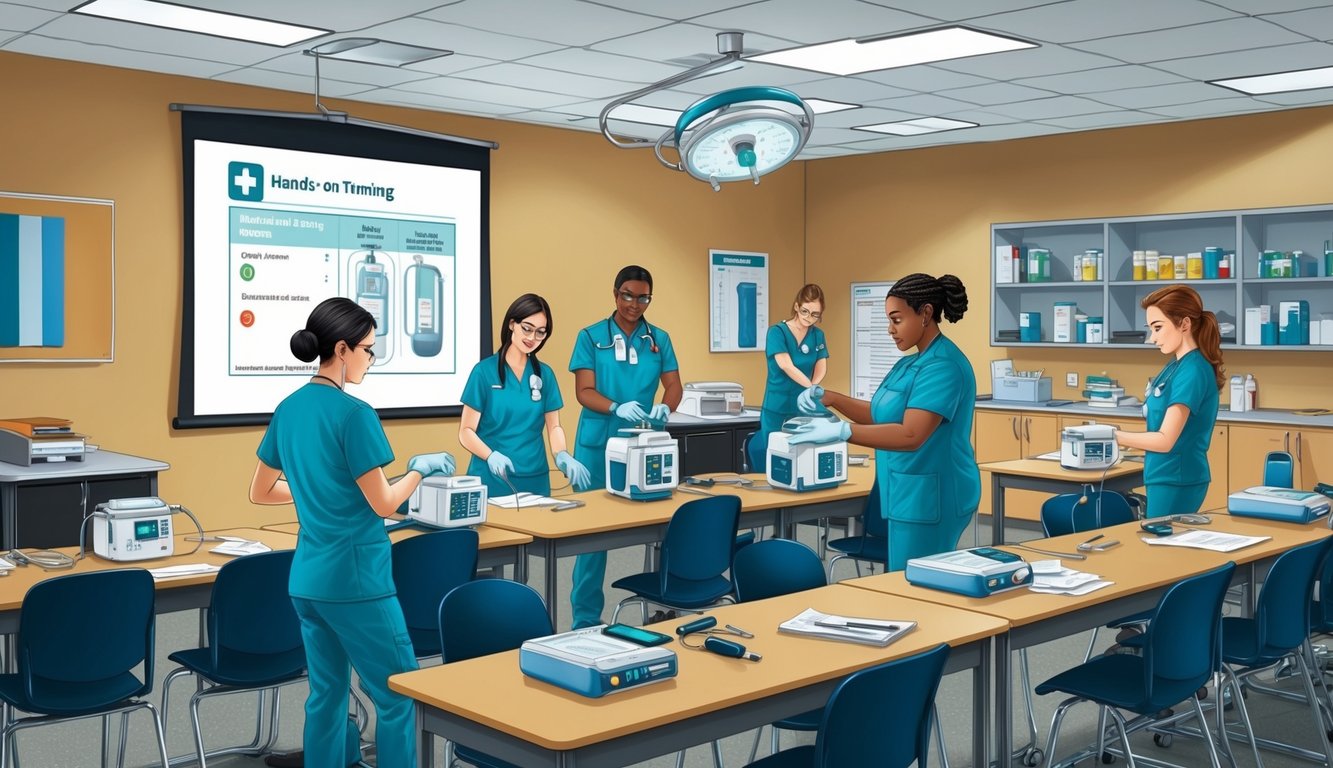
As a 68W Combat Medic, you will encounter numerous growth and advancement opportunities both within the military and beyond.
Your skill set and experience can lead to a range of healthcare roles and educational prospects.
Options within the Military Health System
You’ll have various paths to pursue as a 68W.
Opportunities for specialization might include areas like flight medicine, dive medicine, or special operations.
The National Guard provides part-time service options allowing you to maintain a civilian career concurrently.
Advancement to commissioned officer roles is feasible through programs like ROTC or direct commissioning.
Leadership roles such as platoon sergeant or first sergeant could also be in your future.
The Department of Defense offers civilian healthcare positions where your military background is highly regarded.
Education and Retraining
Your training as a 68W lays a strong foundation for further academic pursuits.
Numerous medics opt to pursue degrees in nursing, physician assistant studies, or other healthcare professions.
The military may provide tuition assistance and GI Bill benefits to help achieve your educational ambitions.
You can enroll in specialized courses aimed at refining your skills in subjects like tactical combat casualty care or extended field care.
Civilian certifications, such as EMT or paramedic qualifications, represent valuable additions to your resume.
Regular sustainment training and annual skill validations ensure your proficiency in emergency medical procedures.
Some medics transition into roles in hospital management or outpatient care administration.
Lifestyle and Benefits
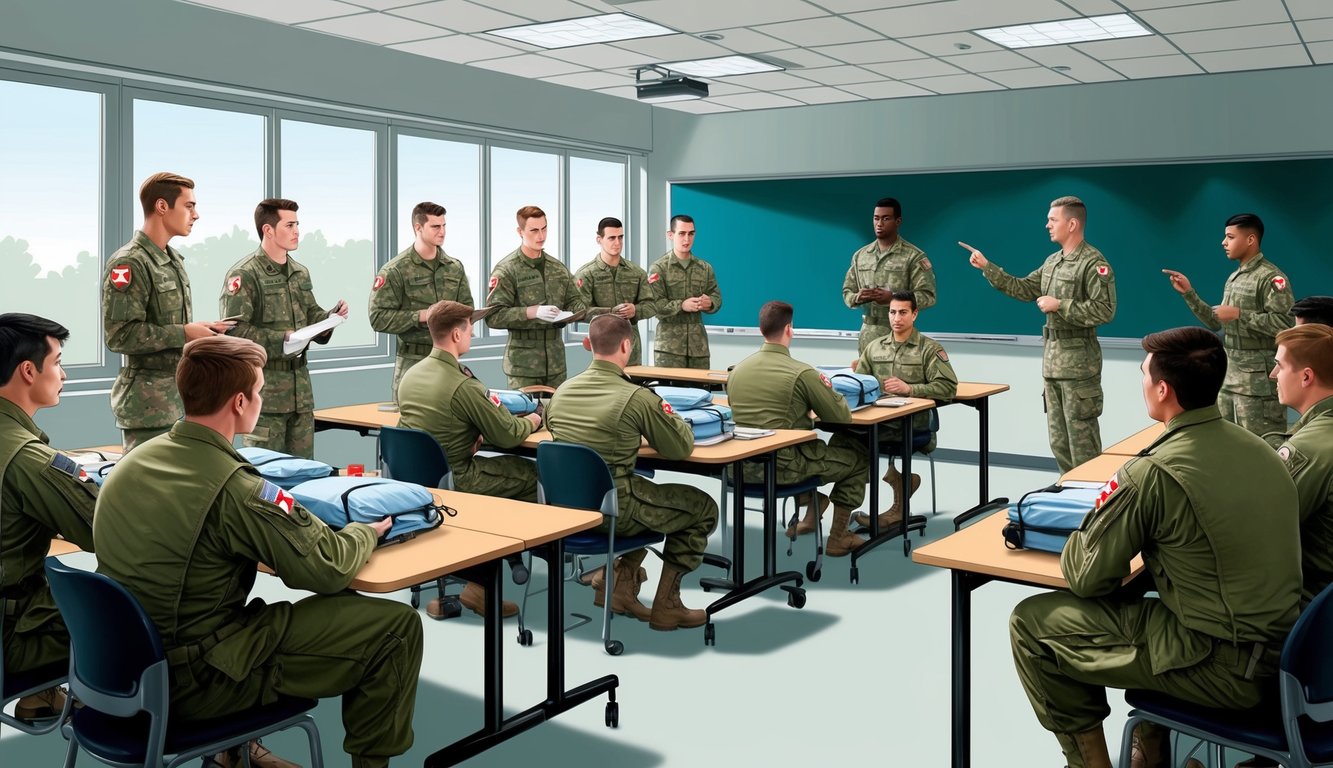
As a 68W Combat Medic, you’ll enjoy a range of benefits and adopt a unique lifestyle.
Your role is pivotal in averting preventable deaths and delivering life-saving medical care to comrades.
Understanding Your Benefits Package
You’ll receive a competitive salary along with comprehensive healthcare coverage for both you and your family.
The Army offers housing allowances or options for on-base accommodation to ensure your living conditions are comfortable.
On duty, you will have access to complimentary meals at Army dining facilities.
Educational benefits are substantial, including tuition assistance and the GI Bill for future educational endeavors.
The Army also provides a retirement plan and life insurance coverage.
Additionally, service members often enjoy travel opportunities and discounts at various retailers.
Life as a Combat Medic
Your daily life will be engaging and rewarding, with tasks ranging from operating in field hospitals to active combat zones.
Regular training sessions will keep your medical skills sharp.
A typical day might include physical training, followed by checks of medical supplies.
Emergency drills are frequent, ensuring you remain prepared for real-life situations.
During your off time, you’ll have access to base facilities such as gyms, recreation areas, and social functions.
Forging strong bonds with fellow medics is part of the experience, with many opportunities for career advancement and specialization in various medical disciplines.
The profound sense of purpose derived from saving lives and supporting your unit is unmatched.
Assessment and Evaluation
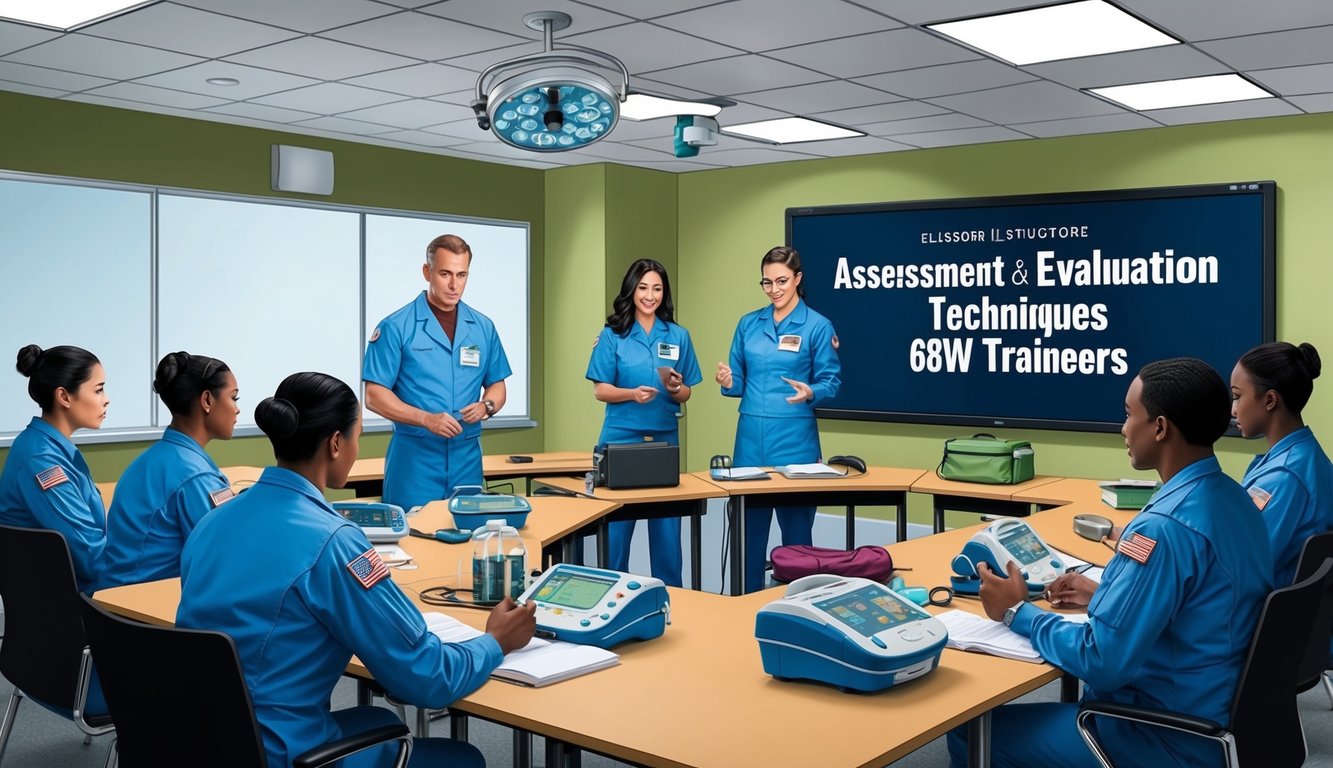
Throughout 68W training, combat medics face rigorous evaluations to ensure they are ready for their crucial responsibilities.
Frequent tests and skill assessments are conducted to validate your medical knowledge and effectiveness.
Being consistently prepared is equally essential for a combat medic.
Testing and Proficiency Checks
Throughout your 68W training, anticipates regular exams and practical evaluations covering extensive medical skills and knowledge.
You will be assessed on your ability to assess patients, follow treatment protocols, and execute emergency procedures.
Expect to demonstrate proficiency in tasks such as:
• Executing CPR and managing airways
• Addressing traumatic injuries and controlling bleeding
• Administering medications
• Conducting sick call evaluations
The NREMT examination represents a critical milestone.
This thorough assessment evaluates your knowledge and capabilities at the EMT level; upon passing, you become a certified 68W combat medic.
Continuous Medical Readiness
Your education as a 68W doesn’t conclude after certification.
You will need to sustain your skills and remain updated on medical protocols.
This will involve:
• Annual skills validation to confirm your proficiency
• Continuous medical education to learn new methodologies
• Regular physical fitness assessments to ensure combat readiness
You will engage in realistic training scenarios to practice your capabilities under pressure.
These exercises are crucial for enhancing your resilience and communication skills.
Remaining prepared is vital, as you may be called upon at any moment to deliver life-saving care.
Frequently Asked Questions

Training to become a 68W combat medic involves a strict schedule, defined requirements, and considerable preparation.
This program is conducted at specialized military facilities and equips trainees with vital medical capabilities for battlefield circumstances.
What does the training schedule look like for 68W AIT?
The Advanced Individual Training (AIT) schedule for 68W is intense, filled with medical classes and practical exercises.
You can expect early starts, full days of learning and practice, with evening study sessions.
Physical training will be a recurring component of your routine.
Weekends may involve additional training or limited free time, contingent on the phase of your course.
Where is the Army combat medic training conducted?
Army combat medic training primarily occurs at Fort Sam Houston in San Antonio, Texas.
This location houses the U.S. Army Medical Center of Excellence.
You’ll undertake your training alongside other medical specialists in a facility designed to simulate various combat situations.
What are the qualifications required for the 68W MOS?
To qualify for the 68W Military Occupational Specialty (MOS), a minimum ASVAB score of 107 in the Skilled Technical (ST) category is required.
Additionally, possessing a valid driver’s license is necessary.
A clean criminal history and the ability to obtain a security clearance are essential.
Good vision and hearing are required, along with physical capacity to complete the job’s demanding tasks.
How can I best prepare for 68W combat medic training?
To prepare effectively for 68W training, prioritize improving your physical fitness.
Engaging in cardio and strength activities will help you meet the rigorous demands of the course.
Familiarize yourself with basic anatomy, medical terms, and first aid principles.
Gain insight into military customs and etiquette.
Develop effective study habits and organizational skills to manage the challenging academic workload.
How long is basic training for a 68W combat medic?
The Basic Combat Training (BCT) for all Army recruits, including prospective 68W combat medics, spans 10 weeks.
This foundational training is followed by the 16-week Advanced Individual Training specific to the 68W MOS.
The overall training duration for a 68W combat medic, including both BCT and AIT, is approximately 26 weeks.
Do civilians have direct access to combat medic training, and how might they acquire it?
Civilians do not have direct access to Army combat medic training.
However, comparable skills can be gained through civilian emergency medical technician (EMT) or paramedic programs.
Some private organizations offer tactical medical courses for civilians, though these programs do not equate to military training.
To receive official 68W training, you must enlist in the Army and fulfill the MOS qualifications.
“`

